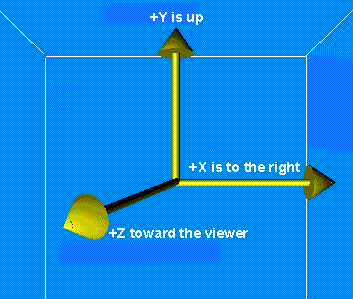本地与全局坐标系变换系统
▌ 核心原理图解
1. 核心变换公式
\begin{cases}
世界坐标 = \text{Transform矩阵} \times 局部坐标 \\
\text{Transform} = \begin{bmatrix}
\cosθ & -\sinθ & x \\
\sinθ & \cosθ & y \\
0 & 0 & 1
\end{bmatrix}
\end{cases}

I. 变换矩阵实现
1.1 数据结构设计
struct Transform2D {
Vec2 position; // 世界坐标位置 (x,y)
float rotation; // 旋转角度(弧度)
float scale; // 均匀缩放系数
// 缓存变换矩阵(每秒自动更新)
Matrix3x3 matrix_cache;
bool dirty_flag = true;
};
1.2 矩阵计算器
Matrix3x3 ComputeTransformMatrix() const {
Matrix3x3 m;
// 缩放部分
m.m[0][0] = cosf(rotation) * scale;
m.m[0][1] = -sinf(rotation) * scale;
m.m[1][0] = sinf(rotation) * scale;
m.m[1][1] = cosf(rotation) * scale;
// 平移部分
m.m[0][2] = position.x;
m.m[1][2] = position.y;
return m;
}
1.3 更新策略
void Transform2D::UpdateCache() {
if(dirty_flag) {
matrix_cache = ComputeTransformMatrix();
dirty_flag = false;
}
}
II. 坐标转换接口
2.1 点变换
// 局部 → 世界
Vec2 TransformPoint(const Vec2& local_point) {
UpdateCache();
return matrix_cache * local_point; // 矩阵乘法
}
// 世界 → 局部
Vec2 InverseTransformPoint(const Vec2& world_point) {
UpdateCache();
return matrix_cache.Inverse() * world_point;
}
2.2 方向转换
Vec2 TransformDirection(const Vec2& local_dir) {
return Vec2(
cosf(rotation)*local_dir.x - sinf(rotation)*local_dir.y,
sinf(rotation)*local_dir.x + cosf(rotation)*local_dir.y
) * scale;
}
2.3 矩阵分解
void DecomposeMatrix(const Matrix3x3& m, Vec2& pos, float& rot, float& scale) {
pos.x = m.m[0][2];
pos.y = m.m[1][2];
scale = sqrtf(m.m[0][0]^2 + m.m[1][0]^2);
rot = atan2f(m.m[1][0]/scale, m.m[0][0]/scale);
}
III. 物理量变换
3.1 力的应用
// 在局部坐标系施加力
void ApplyLocalForce(const Vec2& local_force) {
Vec2 world_force = TransformDirection(local_force);
force_accum += world_force;
}
// 在局部点施加力
void ApplyForceAtLocalPoint(const Vec2& force, const Vec2& local_point) {
Vec2 world_point = TransformPoint(local_point);
ApplyForceAtWorldPoint(force, world_point);
}
3.2 冲量响应
接触点在世界空间计算冲量后,逆向转换到局部空间进行状态修正:
Vec2 local_impulse = InverseTransformDirection(world_impulse);
// 应用局部冲量到物理状态...
IV. 碰撞检测系统
4.1 形状变换流程
graph LR
LocalVerts[局部顶点] --> TransformMatrix[应用Transform矩阵]
TransformMatrix --> WorldVerts[世界空间顶点]
WorldVerts --> SAT[分离轴检测]
4.2 边界更新逻辑
void Shape::UpdateWorldBounds() {
Transform& tf = body->transform;
// 对于凸多边形
for(int i=0; i<local_verts.size(); ++i) {
world_verts[i] = tf.TransformPoint(local_verts[i]);
}
// 重新计算AABB
world_aabb = CalculateAABB(world_verts);
}
V. 相对运动处理
5.1 相对速度计算
// 计算点在世界空间的绝对速度
Vec2 GetWorldVelocityAtPoint(const Vec2& world_point) {
Vec2 r = world_point - position;
return linear_vel + Vec2(-r.y, r.x) * angular_vel; // v + ω×r
}
5.2 多刚体相对观察
计算B相对于A的相对运动:
void ComputeRelativeMotion(const RigidBody& a, const RigidBody& b) {
// 相对线速度:v_B - v_A
relative_linear_vel = b.linear_vel - a.linear_vel;
// 相对角速度:ω_B - ω_A
relative_angular_vel = b.angular_vel - a.angular_vel;
}
VI. 变换优化技巧
6.1 四元数优化(3D准备)
struct Transform3D {
Quaternion rotation; // 使用四元数替代欧拉角
Vec3 position;
float scale;
mutable Matrix4x4 cached_matrix;
};
6.2 变换层级系统
class TransformTree {
TransformNode* root; // 根节点
unordered_map<EntityID, TransformNode*> node_map;
void UpdateHierarchy() {
// 广度优先更新变换树
}
};
6.3 异步更新策略
const float TRANSFORM_UPDATE_INTERVAL = 0.1f; // 10Hz
float update_timer = 0;
// 在游戏循环中:
update_timer += delta_time;
if(update_timer >= TRANSFORM_UPDATE_INTERVAL) {
UpdateAllTransforms();
update_timer -= TRANSFORM_UPDATE_INTERVAL;
}
VIII. 调试可视化
7.1 坐标系绘制
void DebugDraw::DrawLocalAxes(const Transform& tf) {
Vec2 origin = tf.position;
Vec2 x_axis = tf.TransformDirection(Vec2(1,0));
Vec2 y_axis = tf.TransformDirection(Vec2(0,1));
DrawArrow(origin, origin + x_axis, RED); // X轴
DrawArrow(origin, origin + y_axis, GREEN);// Y轴
}
7.2 碰撞形状比较
// 同时绘制局部和世界网格对比
void DrawColliderDebug() {
DrawPolygon(local_verts, BLUE); // 局部坐标系轮廓
DrawPolygon(world_verts, YELLOW); // 世界坐标系轮廓
}
IX. 实用工具方法
8.1 屏幕空间转换
Vec2 WorldToScreen(const Vec2& world_pos, const Camera& cam) {
Matrix3x3 view_matrix = cam.GetViewMatrix();
return view_matrix * world_pos;
}
Vec2 ScreenToWorld(const Vec2& screen_pos, const Camera& cam) {
Matrix3x3 inv_view = cam.GetInvViewMatrix();
return inv_view * screen_pos;
}
8.2 运动学约束
保留物体的局部坐标关系:
void MaintainRelativePosition(Entity& parent, Entity& child) {
Transform ptf = parent.GetTransform();
Transform ctf = child.GetTransform();
// 保持相对位移不变
Vec2 new_child_pos = ptf.TransformPoint(child.local_pos);
child.SetWorldPosition(new_child_pos);
}
X. 常见问题分析
| 现象 | 根本原因 | 解决方案 |
|---|---|---|
| 物理形状错位 | 变换未及时更新 | 强制标记dirty_flag并重新计算 |
| 碰撞检测失效 | 未正确更新世界坐标系顶点 | 添加碰撞阶段形状更新回调 |
| 旋转后出现抖动 | 累积矩阵计算误差 | 定期矩阵正交化处理 |
| 层级变换产生撕裂 | 多级变换顺序错误 | 使用广度优先变换更新策略 |
设计原则总结
- 分层解耦:物理模拟只关注世界坐标系,图形显示处理局部坐标系细节
- 逆可逆性:所有变换必须支持逆向计算(World→Local)
- 状态一致性:确保物理属性和变换矩阵之间的同步
- 性能预判:利用空间划分技术降低转换计算量